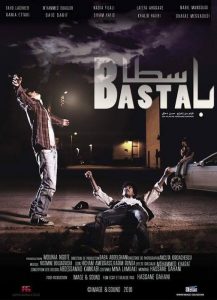
Rabat, Morocco- BASTA may be the first feature film ever to expose the Arab Spring in Morocco. Written and directed by Hassane Dahani, BASTA gives an accurate overview of Moroccan people’s ambitions, frustrations, and paradoxes, through an exceptional display of the different age groups and classes within the society.
BASTA is a drama and action film. Unlike classics, where the story is linear, with one or two heroes, BASTA is a modern film style, with an intriguing plot. The film starts with the last scene before taking the audience to a flashback that tells four main stories in parallel, which intertwine at various stages within the film, and together lead to the same heartbreaking, though expected, unraveling in the end. The various but related family stories in the movie summarize the Moroccan lifestyles with their complexities and contradictions. Though not explicitly predominant, the Arab Spring is present throughout the film, to accompany the film stories, or maybe even offer an alternative way of life to Moroccan society, which is to scream, “BASTA!” (ENOUGH) to each of the social situations and problems exposed in the film.
The movie focuses on the Moroccan youth, as a symbol of the future nation, with both its sorrows and aspirations. Naoufal (Fahd Lechheb) and Maati (Nabil Mansori) are two young best friends, mainly brought together by their dependence on drugs. They are ready for anything to satisfy their addiction. Naoufal is in love with Souad (Rania Ettaki) and dreams of starting a family with her, but his addiction, and her low social status, come in the way of their union. On the other hand, other young people, mainly represented by activist Salma (Siham Hafid,) are brought together by their determination to fight for a better future, and are filling up the streets to protest, marking the Moroccan Arab Spring.
BASTA also sheds light on a generation of beaten parents, who have somehow turned themselves into their own teenage children’s slaves. Some parents, like Naoufal’s mother, Touria (Latefa Ahrrare,) spoil their children to the extent of pushing them towards delinquency, while others, such as Naoufal’s father, Abdellah (M’hammed Ouaglou,) or Souad’s mother, Lghalya (Nadia Filali,) are desperately struggling to save their children from the rising world of drug addiction, poverty, crime, prostitution or power abuse around them. Adults are equally represented by precise social types, such as the devoted, but rather helpless, police officer, Jahid (Abdellatif Chaouqi,) or the wealthy, powerful and abusive Farouk (Khalid Hajibi).
I give BASTA and its director, Hassane Dahani, two thumbs up for more than one reason, but primarily because I believe it is a movie where each scene has been so thoughtfully written, shot and edited that you are guaranteed to want to view the film more than once. One of the most touching scenes, in my opinion, is the one where Abdellah literally begs and even offers to financially support the grocery store owner, Brahim (Elhoucine Bouhcine,) to make sure his own son, Naoufal, stays in prison. The scene succeeds in bringing out the sad truth of what a father’s frustration and despair can lead him to. I personally know a hopeless parent of a teenage drug addict who once confessed that she would rather have her son run over by a truck, in order to cry over his death and then bury him together with her family agony.
The set design in BASTA is fascinating. The film has been shot over a 1000-mile distance, taking the audience through a long car ride with Abdellah and Naoufal from the Moroccan capital, Rabat, to the breathtaking Dakhla peninsula, on the southwest coast of the country. While beautifully traveling with the camera through Morocco’s different landscapes, from mountain to sea to desert, the audience also gets to see how a desperate father, whose aim is to take his son as far away from his ugly lifestyle as possible, is rather choosing to turn a blind eye to the fact that the real ugliness lies within his son himself, not the place he is trying to take him away from.
The dialogues in BASTA have been adapted to represent each age group or social category. They are so accurate that you feel you are taking a tour around Moroccan streets in different neighborhoods, witnessing real life scenes and hearing genuine conversations. The costumes have also been wisely selected to reflect the poignant social disparity between the poorest and richest classes within Morocco. The soundtrack, by musician Yasmine Bouqartacha, has been especially composed, studied and revised for each scene within the film, to depict the different characters’ feelings or actions’ intensity.
The cast has been carefully selected and directed, to lead to the high level of character embodiment observed in the film. I was particularly impressed with Nabil Mansori’s personification of Maati’s character. Nabil excelled at playing the role of the delinquent, aggressive, and disastrously influential Maati, who also happens to be a true symbol of friendship and loyalty. Maati’s confusion and grief in the last scene of the film, brilliantly played by Nabil, literally brought tears to my eyes.
In short, BASTA is definitely a must-see. It’s a film where each Moroccan will see him/herself, or at least someone s/he knows personally. It is also a movie which will help foreigners get a better feel and understanding of Moroccan societal issues.
Mounia Ngote


